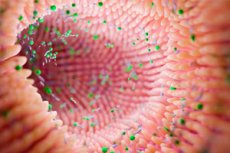New publications
Gut Bacteria Proteins That Affect Hormones, Metabolism, and Bone Health Discovered
Last reviewed: 03.08.2025

All iLive content is medically reviewed or fact checked to ensure as much factual accuracy as possible.
We have strict sourcing guidelines and only link to reputable media sites, academic research institutions and, whenever possible, medically peer reviewed studies. Note that the numbers in parentheses ([1], [2], etc.) are clickable links to these studies.
If you feel that any of our content is inaccurate, out-of-date, or otherwise questionable, please select it and press Ctrl + Enter.

The human gut is home to trillions of microorganisms that produce substances that can regulate the functioning of all organs in the body through the bloodstream and the intestinal nervous system. However, little is known about the effects of most of the bacteria that make up our microbiome.
Now, an international team of scientists led by the University of Copenhagen has identified a common strain of the bacterium that could pave the way for a completely new class of drugs. The study, titled “Polypeptides produced by common bacteria in the human gut improve metabolism in rodents,” is published in the journal Nature Microbiology.
This bacterium produces two protein molecules that are somewhat similar to the hormone irisin. Irisin is released by muscles during physical activity and plays a role in fat metabolism.
The discovered signaling proteins are called RORDEP1 and RORDEP2. They influence the body's hormonal balance, as well as weight, bone density, and blood sugar levels.
"We found that the number of RORDEP-producing bacteria can vary between people by as much as 100,000-fold, and that people with high levels of these bacteria tend to have lower body weight," says Yong Fan, associate professor at the Novo Nordic Foundation's Center for Basic Metabolism Research and lead author of the study.
Weight and blood sugar regulation
In the study, the researchers describe how RORDEP proteins increase the body’s own hormones, such as GLP-1 and PYY, which help regulate appetite and glucose levels, as well as insulin, which is needed to maintain stable blood sugar levels. At the same time, RORDEP proteins suppress the hormone GIP, which can contribute to weight gain. In addition, these proteins directly enhance fat burning.
"In experiments on rats and mice that were injected with either RORDEP-producing bacteria or the RORDEP proteins themselves, we saw less weight gain and lower blood sugar levels, as well as increased bone density. This is exciting because it is the first time that we have mapped the gut bacteria that alter our hormonal makeup," says Yong Fan.
A paradigm shift in the treatment of chronic diseases
Research into the role of gut bacteria in human health led scientists from the University of Copenhagen to found the biotechnology company GutCRINE two years ago with financial support from the university.
The first clinical trials have already begun. One study is giving healthy participants live bacteria that produce RORDEP to study their effects on human biology. Another trial is looking at the effect of the RORDEP1 protein.
“We are now translating basic research into clinical studies to find out whether RORDEP-producing bacteria or the RORDEP proteins themselves – in natural or chemically modified form – could form the basis for a new class of biological drugs known as pharmabiotics,” says Professor Oluf Pedersen from the University of Copenhagen, the project leader and senior author of the study.
He adds:
“Looking ahead to 10-15 years, we aim to test the potential of RORDEP-producing bacteria for both prevention and treatment. We want to find out whether they can become next-generation probiotics used as a dietary supplement to prevent common chronic diseases, and whether RORDEP proteins in modified form can be developed into future drugs for cardiovascular disease, obesity, diabetes and osteoporosis.”
The study was conducted in collaboration with scientists from the University of Copenhagen, Herlev Gentofte Hospital, Zealand University Hospital, Novo Nordisk A/S, the Technical University of Denmark, Steno Diabetes Centre and Chongqing Medical University (China).
